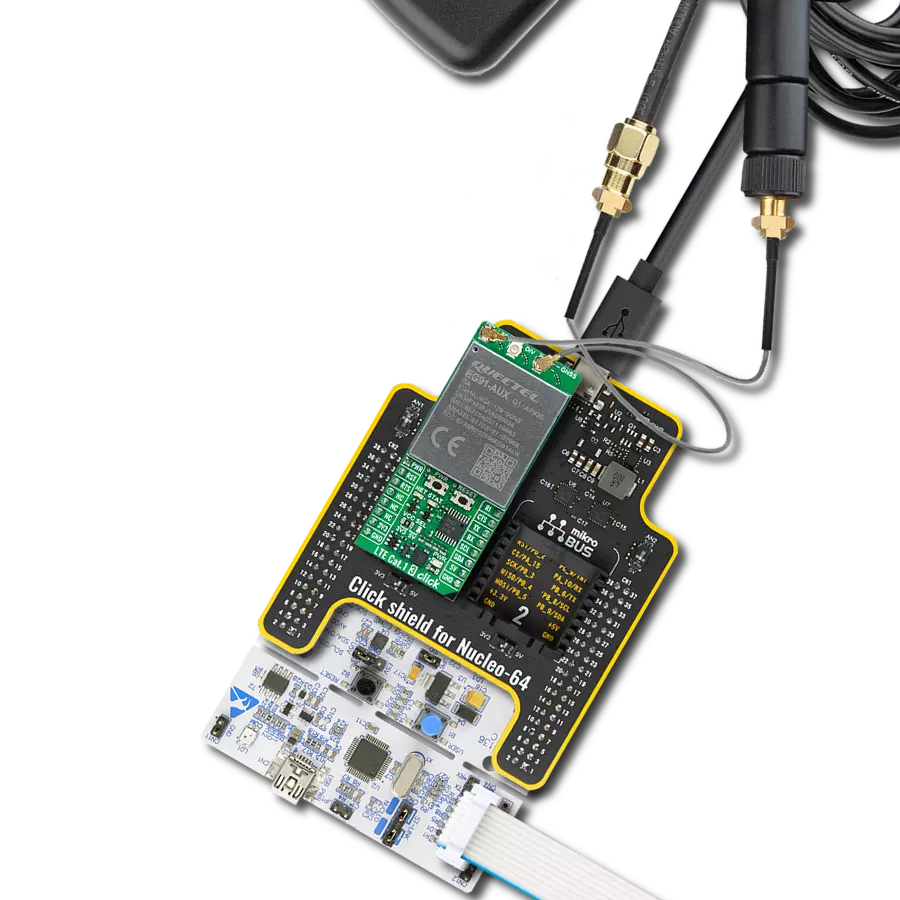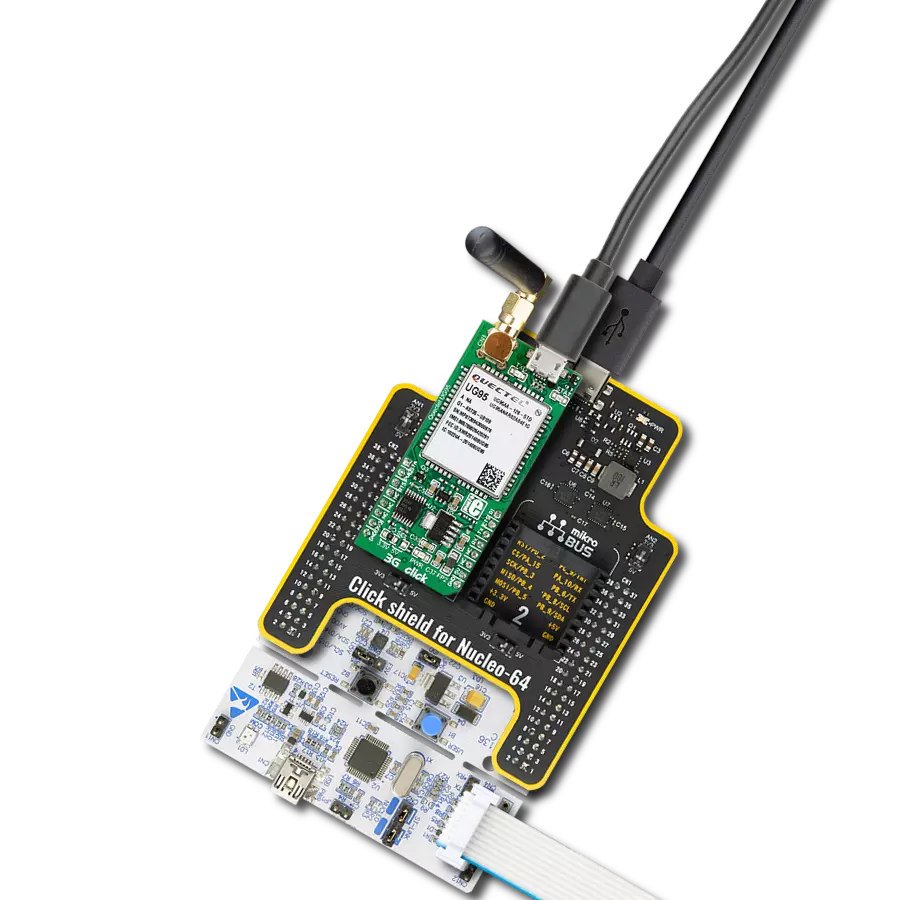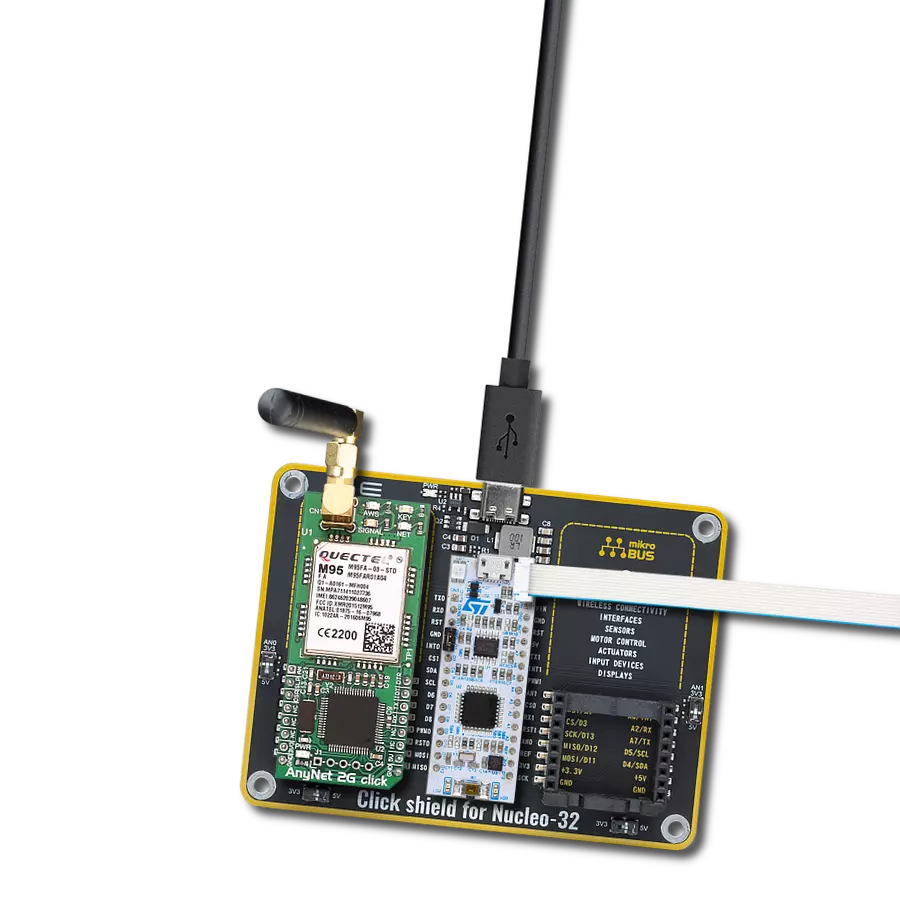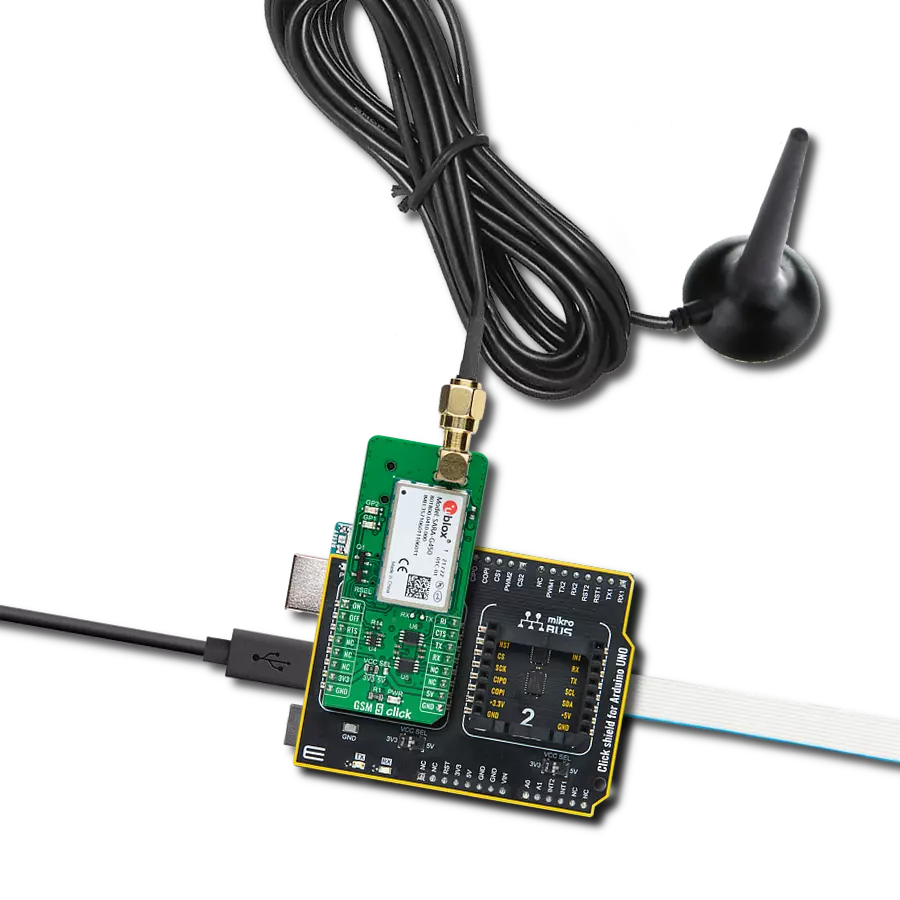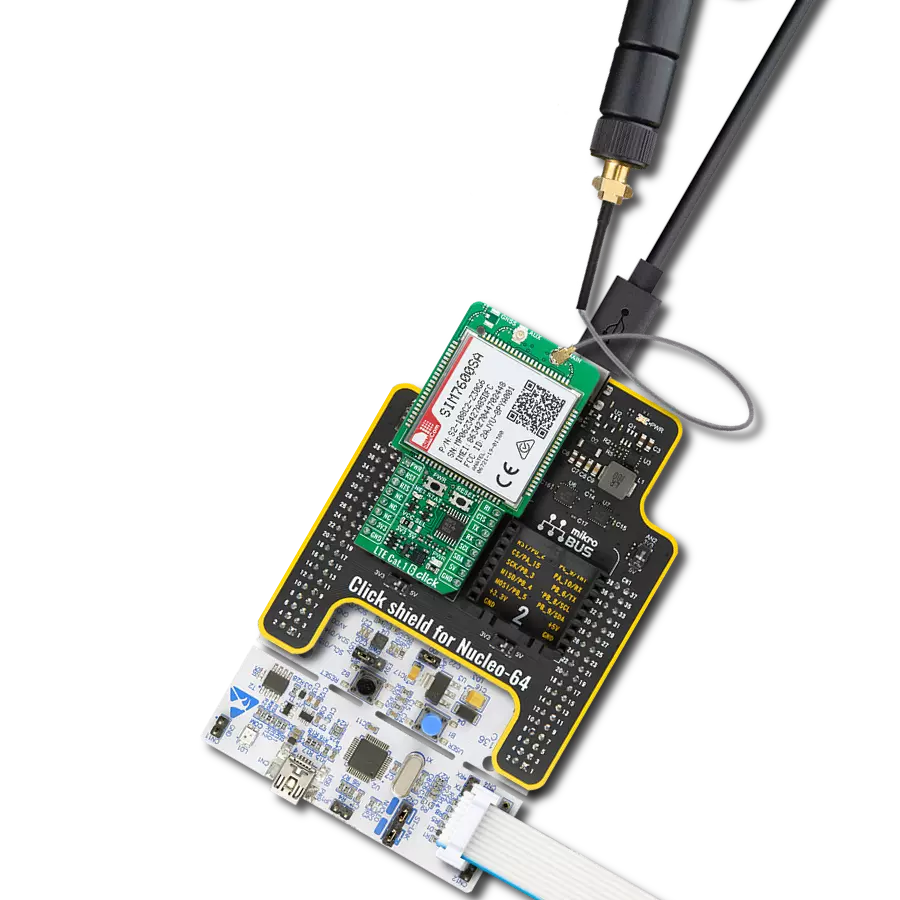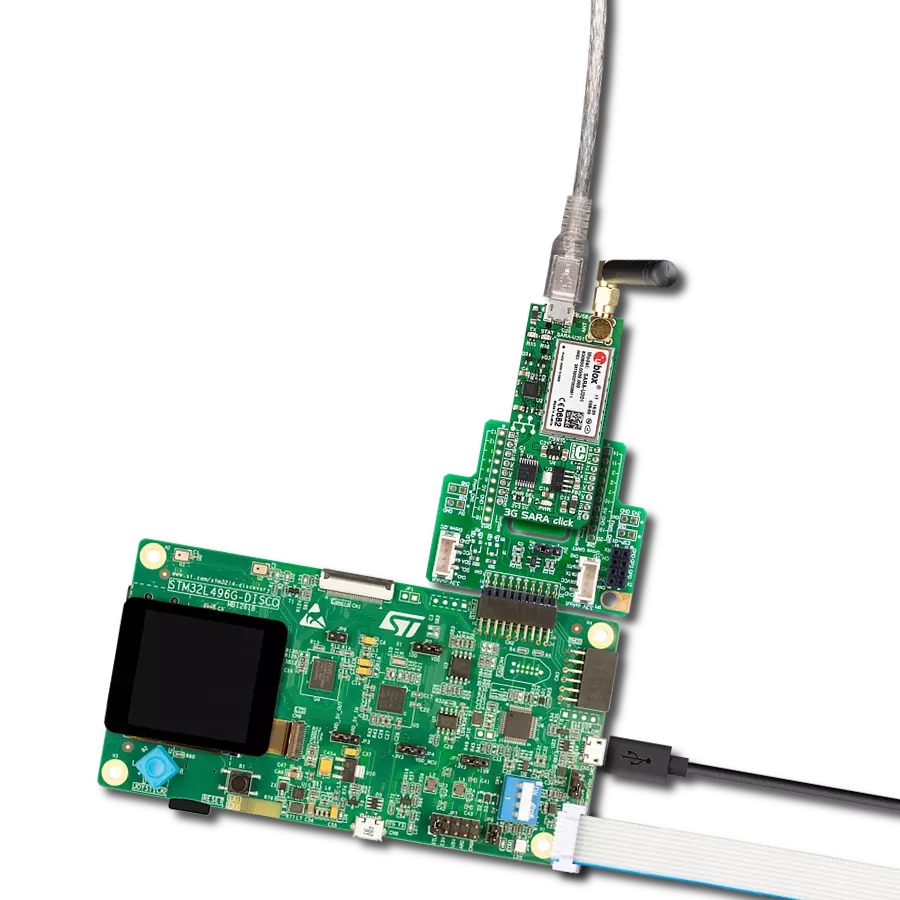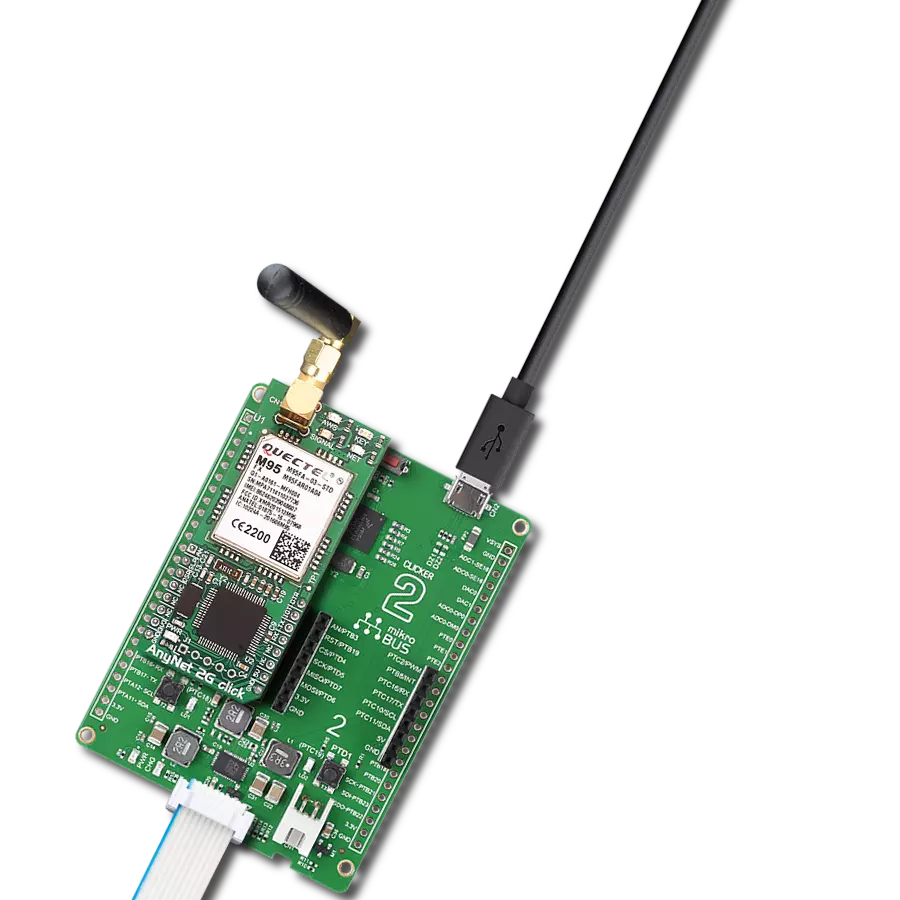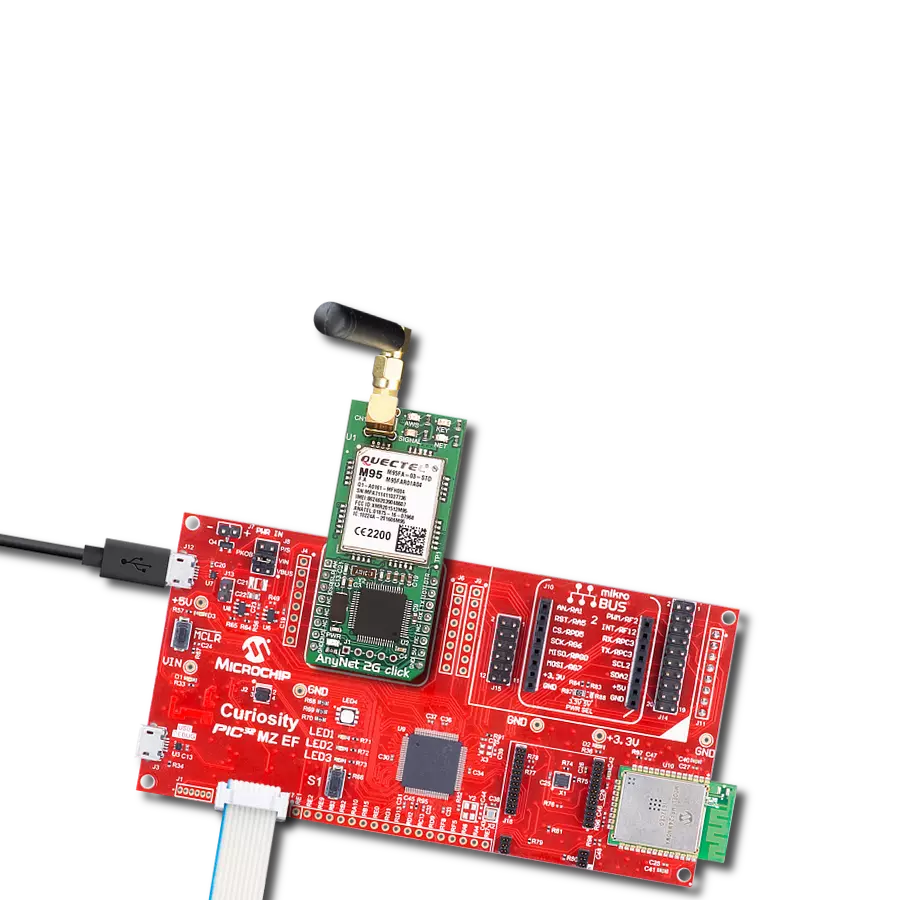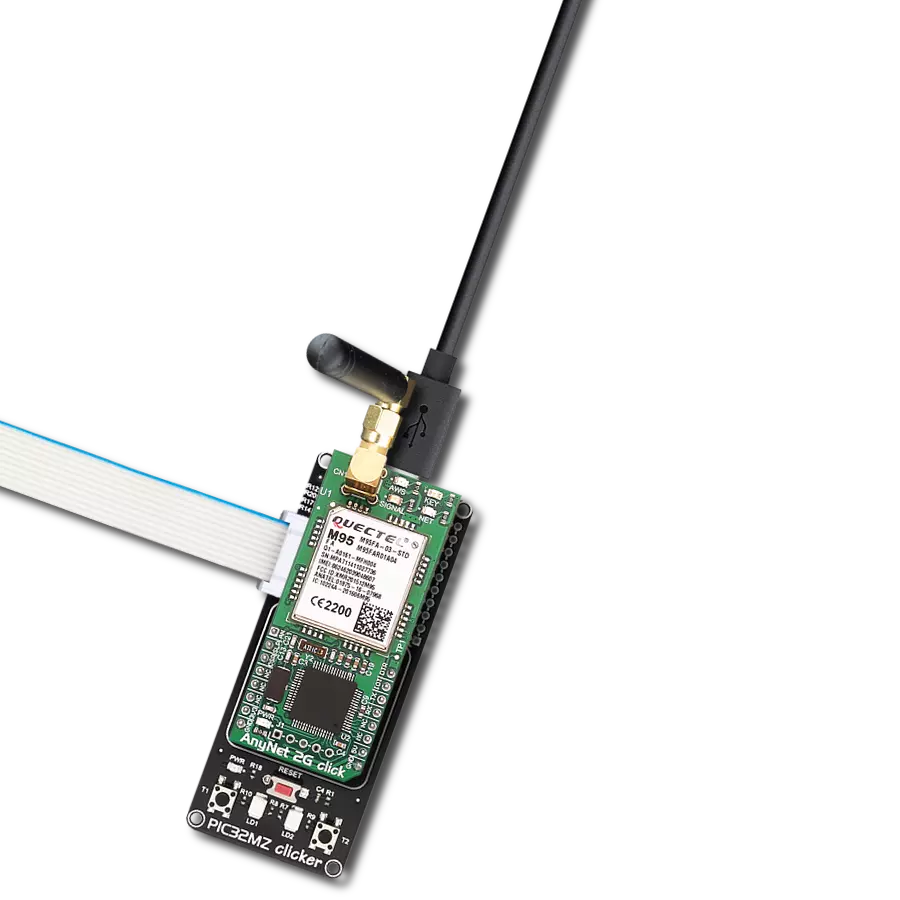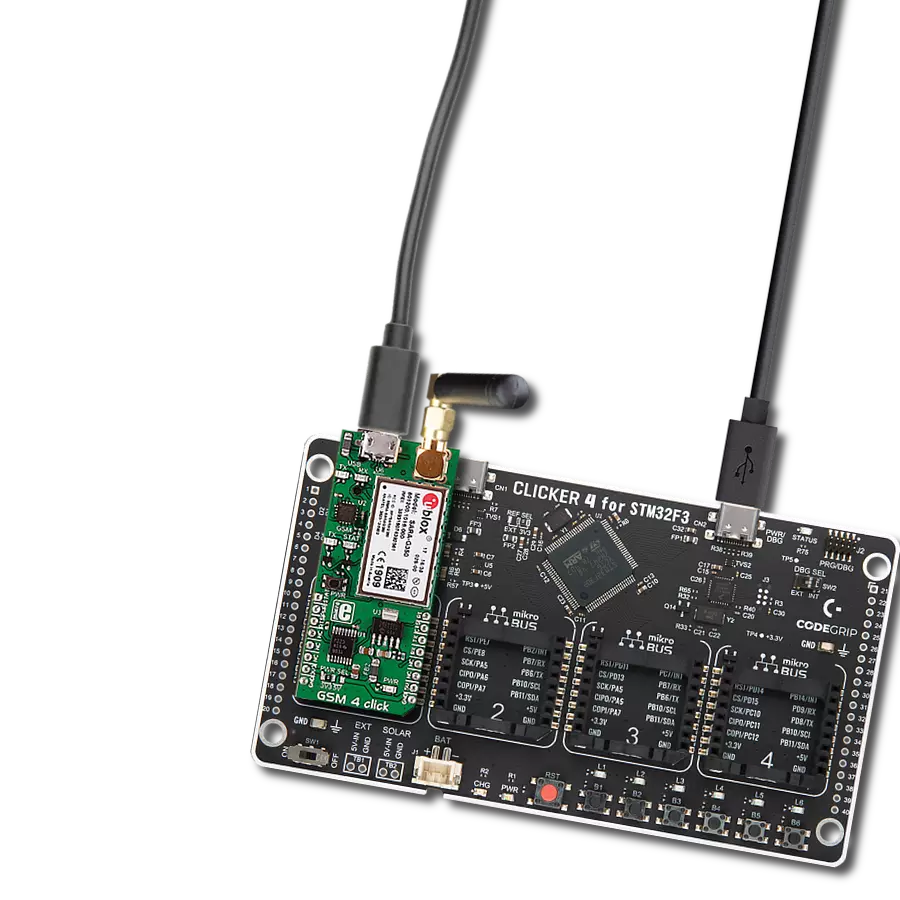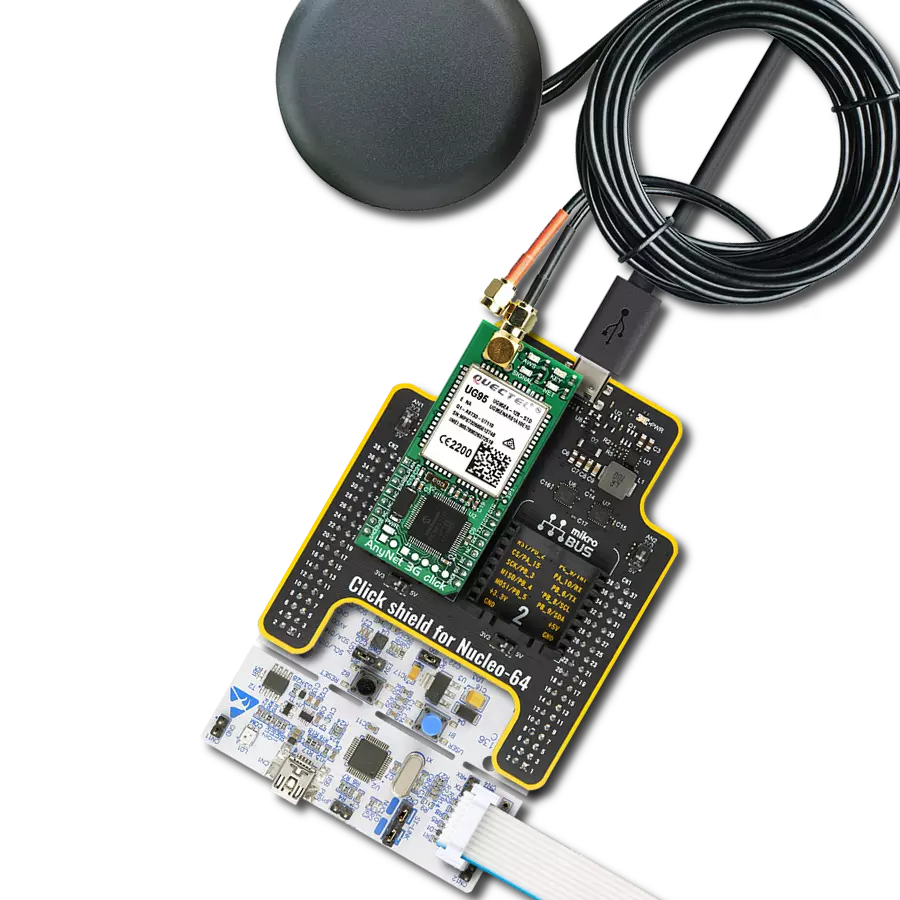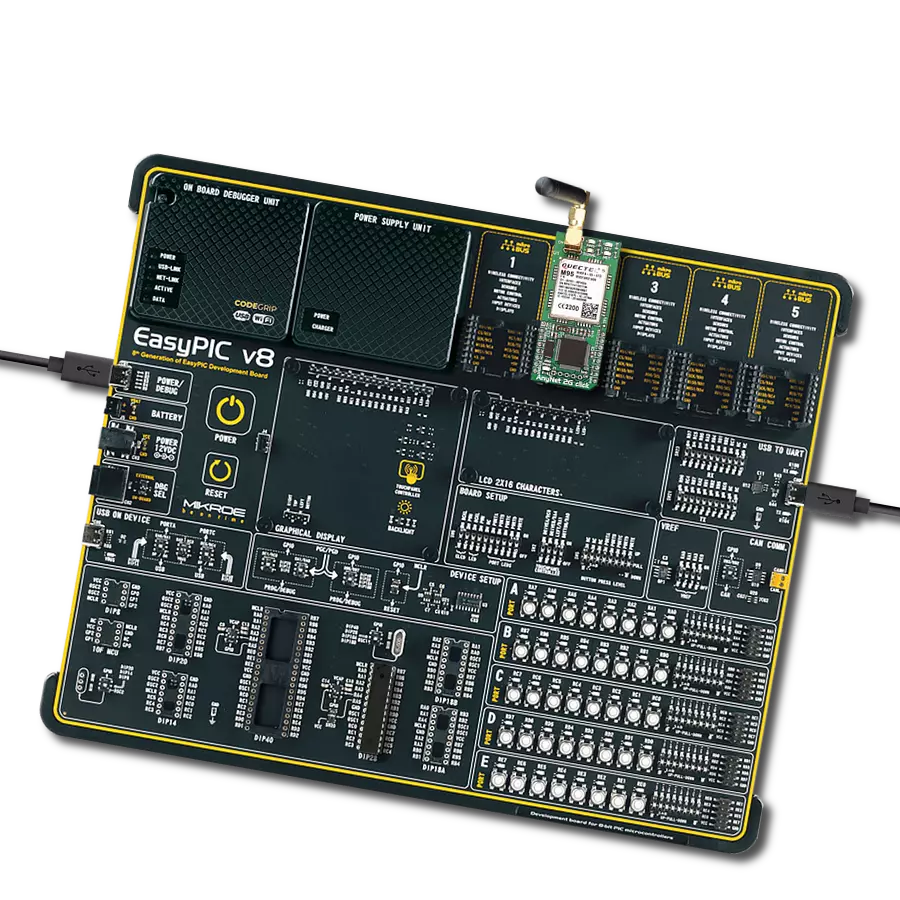Step into a world of possibilities with our cellular network communication solution, offering everything you need, from network indication to a complete TCP/UDP stack and advanced HTTP/HTTPS transfer capabilities, ensuring unparalleled connectivity and communication efficiency
A
A
Hardware Overview
How does it work?
3G SARA Click is based on the SARA U-201, a compact 3.75G UMTS/HSPA modem from u-blox. The SARA U-201 module can be used worldwide. A complete list of frequencies and other relevant info about the module can be found in the SARA U-201 datasheet. This device is the main component of the click board, and it consists of several internal blocks or sections, such as the antenna switching section, RF transceiver section, memory, power management, and, most importantly - the cellular baseband processor. This section contains the logic necessary for managing the other sections and provides the interface to the host MCU. This interface consists of several lines that report the antenna status, SIM card status, SIM card interface lines, GPIOs, UART interface lines, USB interface lines, I2C bus lines, device control lines, and I2S bus lines. These lines are routed to the respective elements of the click board. The SARA U-201 module has to be powered by a clean and stable power supply. The voltage needed for the module to work properly is about 4V, and it is derived from the 5V mikroBUS™ rail through the MCP1826, a 1A low drop output (LDO) regulator from Microchip. Although the SARA U-201 is a low-power device, the cellular network modules, in general, are notorious for their high power consumption, so the 1A LDO had to be used. Digital sections of the SARA U-201 are internally supplied by 1.8V, so it is necessary to condition the communication bus lines that
connect the host MCU with the module. For this reason, another small LDO is used, providing a needed reference voltage for one side of the TXB0106, a 6-bit bidirectional level shifting and voltage translator with automatic direction sensing from Texas Instruments. The reference voltage for the other side of the level shifter is taken from the onboard SMD jumper, labeled as PWR SEL. This jumper selects between 3.3V and 5V from the mikroBUS™, depending on the used MCU type and its logic voltage level requirements. The UART bus of the SARA U-201 module is connected to one side of the level shifter, while the other side (shifted) is connected to the respective mikroBUS™ UART pins. However, the SARA U-201 module is designed as the traditional DCE device (Data Communication Equipment), offering the full UART pin count, including the hardware flow control pins (CTS, RTS). These pins are routed to the mikroBUS™ CS (RTS) and the INT pin (CTS) and can be used in the MCU software if the hardware flow control is needed. The RI pin is the ringing indicator routed to the mikroBUS™ PWM pin. The STAT pin is used to signal the network connection status. This pin is routed to the mikroBUS™ AN pin through the level shifter, and the yellow LED is used to indicate the network connection's status visually. The transmitting status is indicated by the red TX LED next to the STAT LED. The PWRKEY pin is routed to the mikroBUS™ RST pin and used during the
power-up sequence. A low pulse on this pin will power the device if a valid supply voltage is provided. To properly detach from the network and store the working parameters in its non-volatile memory, the module should be safely powered off either by issuing the AT+CPWROFF command or by a low pulse on the PWRKEY pin for at least 1 second before disconnecting the power source. As mentioned, SARA U-201 offers the I2S interface, mainly used for digital audio. The MAX9860, a 16-bit mono audio voice CODEC IC from Maxim Integrated, provides the 3G SARA click board with voice communication. This IC uses the I2S and I2C interfaces to communicate with the SARA U-201 module. It is also powered with 1.8V from the LDO, so no level shifting is required. This IC provides a clean and audible analog interface for connecting the headset, with one audio output channel and one microphone input channel. The headset can be connected via the onboard 3.5mm audio jack. SARA 3G click is equipped with a micro USB connector. It allows the module to be powered and configured by a personal computer (PC). u-blox company offers a software suite that can be used to configure the SARA U-201 module. The Micro SIM card holder on the back of the click board™ is used to install a SIM card. This device can not be used without a valid SIM card, which allows connection to the cellular network. Both 1.8V and 3V SIM card types are supported.
Features overview
Development board
PIC18F57Q43 Curiosity Nano evaluation kit is a cutting-edge hardware platform designed to evaluate microcontrollers within the PIC18-Q43 family. Central to its design is the inclusion of the powerful PIC18F57Q43 microcontroller (MCU), offering advanced functionalities and robust performance. Key features of this evaluation kit include a yellow user LED and a responsive
mechanical user switch, providing seamless interaction and testing. The provision for a 32.768kHz crystal footprint ensures precision timing capabilities. With an onboard debugger boasting a green power and status LED, programming and debugging become intuitive and efficient. Further enhancing its utility is the Virtual serial port (CDC) and a debug GPIO channel (DGI
GPIO), offering extensive connectivity options. Powered via USB, this kit boasts an adjustable target voltage feature facilitated by the MIC5353 LDO regulator, ensuring stable operation with an output voltage ranging from 1.8V to 5.1V, with a maximum output current of 500mA, subject to ambient temperature and voltage constraints.
Microcontroller Overview
MCU Card / MCU
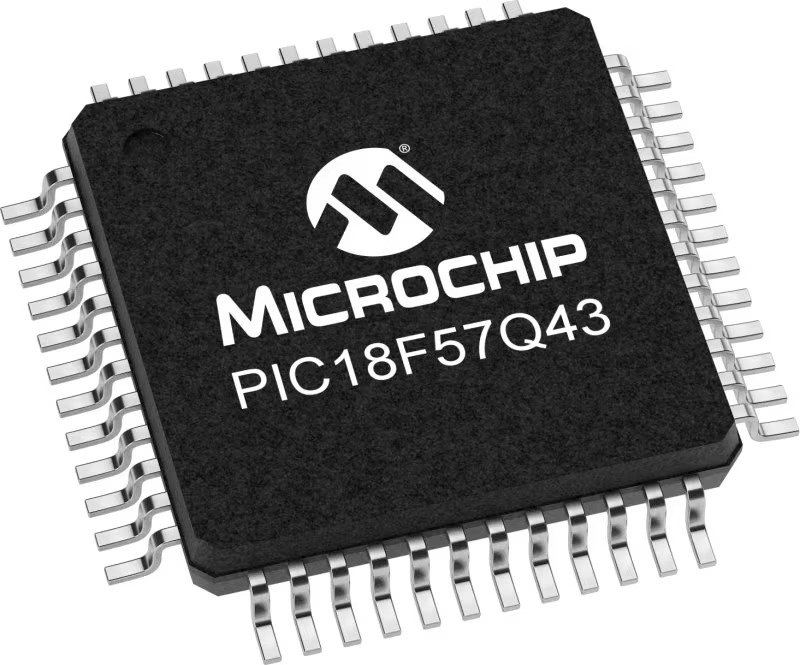
Architecture
PIC
MCU Memory (KB)
128
Silicon Vendor
Microchip
Pin count
48
RAM (Bytes)
8196
You complete me!
Accessories
Curiosity Nano Base for Click boards is a versatile hardware extension platform created to streamline the integration between Curiosity Nano kits and extension boards, tailored explicitly for the mikroBUS™-standardized Click boards and Xplained Pro extension boards. This innovative base board (shield) offers seamless connectivity and expansion possibilities, simplifying experimentation and development. Key features include USB power compatibility from the Curiosity Nano kit, alongside an alternative external power input option for enhanced flexibility. The onboard Li-Ion/LiPo charger and management circuit ensure smooth operation for battery-powered applications, simplifying usage and management. Moreover, the base incorporates a fixed 3.3V PSU dedicated to target and mikroBUS™ power rails, alongside a fixed 5.0V boost converter catering to 5V power rails of mikroBUS™ sockets, providing stable power delivery for various connected devices.
Rubber Antenna GSM/GPRS Right Angle is the perfect companion for all GSM Click boards™ in our extensive lineup. This specialized antenna is designed to optimize your wireless connectivity with impressive features. With a wide frequency range spanning 824-894/1710-1990MHz or 890-960/1710-1890MHz, it can handle various frequency bands, ensuring a seamless and reliable connection. The antenna boasts an impedance of 50 Ohms and a gain of 2dB, enhancing signal reception and transmission. Its 70/180MHz bandwidth provides flexibility for diverse applications. The vertical polarization further enhances its performance. With a maximum input power capacity of 50W, this antenna ensures robust communication even under demanding conditions. Measuring a compact 50mm in length and featuring an SMA male connector, the Rubber Antenna GSM/GPRS Right Angle is a versatile and compact solution for your wireless communication needs.
Used MCU Pins
mikroBUS™ mapper
Take a closer look
Click board™ Schematic

Step by step
Project assembly
Track your results in real time
Application Output
1. Application Output - In Debug mode, the 'Application Output' window enables real-time data monitoring, offering direct insight into execution results. Ensure proper data display by configuring the environment correctly using the provided tutorial.

2. UART Terminal - Use the UART Terminal to monitor data transmission via a USB to UART converter, allowing direct communication between the Click board™ and your development system. Configure the baud rate and other serial settings according to your project's requirements to ensure proper functionality. For step-by-step setup instructions, refer to the provided tutorial.
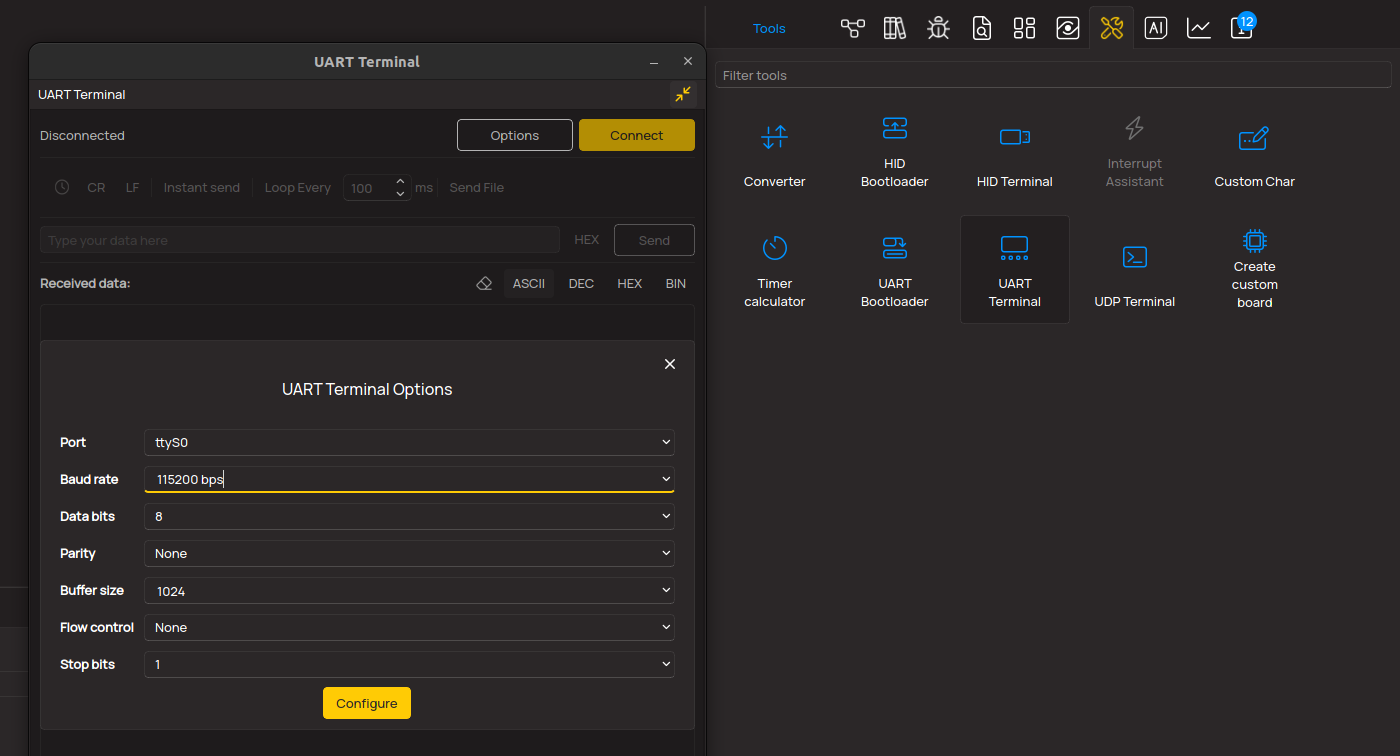
3. Plot Output - The Plot feature offers a powerful way to visualize real-time sensor data, enabling trend analysis, debugging, and comparison of multiple data points. To set it up correctly, follow the provided tutorial, which includes a step-by-step example of using the Plot feature to display Click board™ readings. To use the Plot feature in your code, use the function: plot(*insert_graph_name*, variable_name);. This is a general format, and it is up to the user to replace 'insert_graph_name' with the actual graph name and 'variable_name' with the parameter to be displayed.
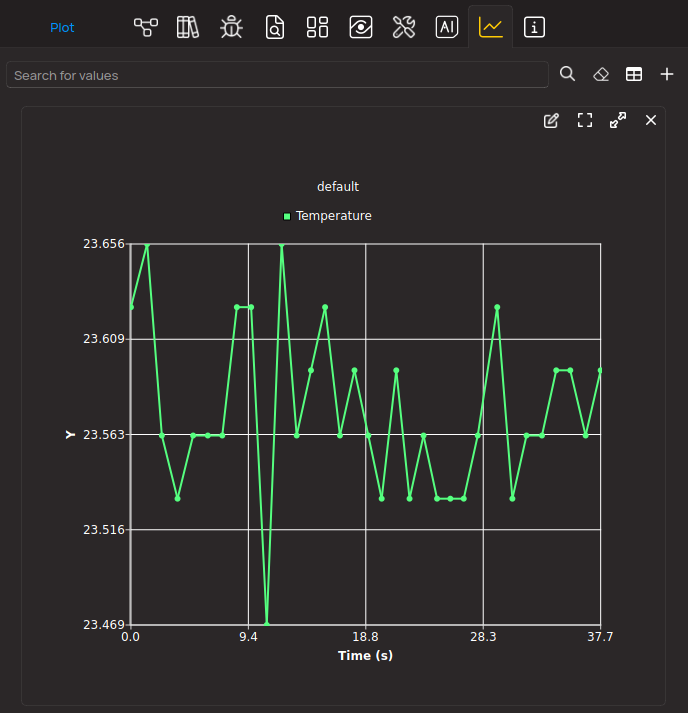
Software Support
Library Description
This library contains API for 3G SARA Click driver.
Key functions:
c3gsara_set_sim_apn- This function sets APN for sim cardc3gsara_send_sms_text- This function sends text message to a phone numberc3gsara_send_sms_pdu- This function sends text message to a phone number in PDU mode
Open Source
Code example
The complete application code and a ready-to-use project are available through the NECTO Studio Package Manager for direct installation in the NECTO Studio. The application code can also be found on the MIKROE GitHub account.
/*!
* @file main.c
* @brief 3G SARA Click Example.
*
* # Description
* Application example shows device capability of connecting to the network and
* sending SMS or TCP/UDP messages using standard "AT" commands.
*
* The demo application is composed of two sections :
*
* ## Application Init
* Initializes the driver, tests the communication by sending "AT" command, and after that restarts the device.
*
* ## Application Task
* Application task is split in few stages:
* - C3GSARA_CONFIGURE_FOR_NETWORK:
* Sets configuration to device to be able to connect to the network.
*
* - C3GSARA_WAIT_FOR_CONNECTION:
* Waits for the network registration indicated via CREG URC event and then checks
* the connection status.
*
* - C3GSARA_CONFIGURE_FOR_EXAMPLE:
* Sets the device configuration for sending SMS or TCP/UDP messages depending on the selected demo example.
*
* - C3GSARA_EXAMPLE:
* Depending on the selected demo example, it sends an SMS message (in PDU or TXT mode) or TCP/UDP message.
*
* By default, the TCP/UDP example is selected.
*
* ## Additional Function
* - static void c3gsara_clear_app_buf ( void )
* - static err_t c3gsara_process ( void )
* - static void c3gsara_error_check( err_t error_flag )
* - static void c3gsara_log_app_buf ( void )
* - static err_t c3gsara_rsp_check ( uint8_t *rsp )
* - static err_t c3gsara_configure_for_connection( void )
* - static err_t c3gsara_check_connection( void )
* - static err_t c3gsara_configure_for_messages( void )
* - static err_t c3gsara_send_message( void )
*
* @note
* In order for the examples to work, user needs to set the APN and SMSC (SMS PDU mode only)
* of entered SIM card as well as the phone number (SMS mode only) to which he wants to send an SMS.
* Enter valid values for the following macros: SIM_APN, SIM_SMSC and PHONE_NUMBER_TO_MESSAGE.
* Example:
SIM_APN "internet"
SIM_SMSC "+381610401"
PHONE_NUMBER_TO_MESSAGE "+381659999999"
*
* @author Stefan Filipovic
*
*/
#include "board.h"
#include "log.h"
#include "c3gsara.h"
#include "conversions.h"
// Example selection macros
#define EXAMPLE_TCP_UDP 0 // Example of sending messages to a TCP/UDP echo server
#define EXAMPLE_SMS 1 // Example of sending SMS to a phone number
#define DEMO_EXAMPLE EXAMPLE_TCP_UDP // Example selection macro
// SIM APN config
#define SIM_APN "" // Set valid SIM APN
// SMS example parameters
#define SIM_SMSC "" // Set valid SMS Service Center Address - only in SMS PDU mode
#define PHONE_NUMBER_TO_MESSAGE "" // Set Phone number to message
#define SMS_MODE "1" // SMS mode: "0" - PDU, "1" - TXT
// TCP/UDP example parameters
#define REMOTE_IP "77.46.162.162" // TCP/UDP echo server IP address
#define REMOTE_PORT "51111" // TCP/UDP echo server port
// Message content
#define MESSAGE_CONTENT "3G SARA Click board - demo example."
// Application buffer size
#define APP_BUFFER_SIZE 256
#define PROCESS_BUFFER_SIZE 256
/**
* @brief Example states.
* @details Predefined enum values for application example state.
*/
typedef enum
{
C3GSARA_CONFIGURE_FOR_NETWORK = 1,
C3GSARA_WAIT_FOR_CONNECTION,
C3GSARA_CONFIGURE_FOR_EXAMPLE,
C3GSARA_EXAMPLE
} c3gsara_example_state_t;
static c3gsara_t c3gsara;
static log_t logger;
/**
* @brief Application example variables.
* @details Variables used in application example.
*/
static uint8_t app_buf[ APP_BUFFER_SIZE ] = { 0 };
static int32_t app_buf_len = 0;
static err_t error_flag;
static c3gsara_example_state_t example_state;
/**
* @brief Clearing application buffer.
* @details This function clears memory of application
* buffer and reset its length and counter.
*/
static void c3gsara_clear_app_buf ( void );
/**
* @brief Data reading function.
* @details This function reads data from device and
* appends it to the application buffer.
* @return @li @c 0 - Some data is read.
* @li @c -1 - Nothing is read.
* See #err_t definition for detailed explanation.
*/
static err_t c3gsara_process ( void );
/**
* @brief Check for errors.
* @details This function checks for different types of
* errors and logs them on UART or logs the response if no errors occured.
* @param[in] error_flag Error flag to check.
*/
static void c3gsara_error_check ( err_t error_flag );
/**
* @brief Logs application buffer.
* @details This function logs data from application buffer.
*/
static void c3gsara_log_app_buf ( void );
/**
* @brief Response check.
* @details This function checks for response and
* returns the status of response.
* @param[in] rsp Expected response.
* @return @li @c 0 - OK response.
* @li @c -2 - Timeout error.
* @li @c -3 - Command error.
* @li @c -4 - Unknown error.
* See #err_t definition for detailed explanation.
*/
static err_t c3gsara_rsp_check ( uint8_t *rsp );
/**
* @brief Configure device for connection to the network.
* @details Sends commands to configure and enable
* connection to the specified network.
* @return @li @c 0 - OK response.
* @li @c -2 - Timeout error.
* @li @c -3 - Command error.
* @li @c -4 - Unknown error.
* See #err_t definition for detailed explanation.
*/
static err_t c3gsara_configure_for_network ( void );
/**
* @brief Wait for connection signal.
* @details Wait for connection signal from CREG URC.
* @return @li @c 0 - OK response.
* @li @c -2 - Timeout error.
* @li @c -3 - Command error.
* @li @c -4 - Unknown error.
* See #err_t definition for detailed explanation.
*/
static err_t c3gsara_check_connection ( void );
/**
* @brief Configure device for example.
* @details Configure device for the specified example.
* @return @li @c 0 - OK response.
* @li @c -2 - Timeout error.
* @li @c -3 - Command error.
* @li @c -4 - Unknown error.
* See #err_t definition for detailed explanation.
*/
static err_t c3gsara_configure_for_example ( void );
/**
* @brief Execute example.
* @details This function executes SMS or TCP/UDP example depending on the DEMO_EXAMPLE macro.
* @return @li @c 0 - OK response.
* @li @c -2 - Timeout error.
* @li @c -3 - Command error.
* @li @c -4 - Unknown error.
* See #err_t definition for detailed explanation.
*/
static err_t c3gsara_example ( void );
void application_init ( void )
{
log_cfg_t log_cfg; /**< Logger config object. */
c3gsara_cfg_t c3gsara_cfg; /**< Click config object. */
/**
* Logger initialization.
* Default baud rate: 115200
* Default log level: LOG_LEVEL_DEBUG
* @note If USB_UART_RX and USB_UART_TX
* are defined as HAL_PIN_NC, you will
* need to define them manually for log to work.
* See @b LOG_MAP_USB_UART macro definition for detailed explanation.
*/
LOG_MAP_USB_UART( log_cfg );
log_init( &logger, &log_cfg );
log_info( &logger, " Application Init " );
// Click initialization.
c3gsara_cfg_setup( &c3gsara_cfg );
C3GSARA_MAP_MIKROBUS( c3gsara_cfg, MIKROBUS_1 );
if ( UART_ERROR == c3gsara_init( &c3gsara, &c3gsara_cfg ) )
{
log_error( &logger, " Application Init Error. " );
log_info( &logger, " Please, run program again... " );
for ( ; ; );
}
c3gsara_set_power_state ( &c3gsara, C3GSARA_POWER_STATE_ON );
c3gsara_process( );
c3gsara_clear_app_buf( );
// Check communication
c3gsara_send_cmd( &c3gsara, C3GSARA_CMD_AT );
error_flag = c3gsara_rsp_check( C3GSARA_RSP_OK );
c3gsara_error_check( error_flag );
// Restart device
#define RESTART_DEVICE "1,1"
c3gsara_send_cmd_with_par( &c3gsara, C3GSARA_CMD_CFUN, RESTART_DEVICE );
error_flag = c3gsara_rsp_check( C3GSARA_RSP_OK );
c3gsara_error_check( error_flag );
log_info( &logger, " Application Task " );
example_state = C3GSARA_CONFIGURE_FOR_NETWORK;
}
void application_task ( void )
{
switch ( example_state )
{
case C3GSARA_CONFIGURE_FOR_NETWORK:
{
if ( C3GSARA_OK == c3gsara_configure_for_network( ) )
{
example_state = C3GSARA_WAIT_FOR_CONNECTION;
}
break;
}
case C3GSARA_WAIT_FOR_CONNECTION:
{
if ( C3GSARA_OK == c3gsara_check_connection( ) )
{
example_state = C3GSARA_CONFIGURE_FOR_EXAMPLE;
}
break;
}
case C3GSARA_CONFIGURE_FOR_EXAMPLE:
{
if ( C3GSARA_OK == c3gsara_configure_for_example( ) )
{
example_state = C3GSARA_EXAMPLE;
}
break;
}
case C3GSARA_EXAMPLE:
{
c3gsara_example( );
break;
}
default:
{
log_error( &logger, " Example state." );
break;
}
}
}
int main ( void )
{
/* Do not remove this line or clock might not be set correctly. */
#ifdef PREINIT_SUPPORTED
preinit();
#endif
application_init( );
for ( ; ; )
{
application_task( );
}
return 0;
}
static void c3gsara_clear_app_buf ( void )
{
memset( app_buf, 0, app_buf_len );
app_buf_len = 0;
}
static err_t c3gsara_process ( void )
{
uint8_t rx_buf[ PROCESS_BUFFER_SIZE ] = { 0 };
int32_t rx_size = 0;
rx_size = c3gsara_generic_read( &c3gsara, rx_buf, PROCESS_BUFFER_SIZE );
if ( rx_size > 0 )
{
int32_t buf_cnt = app_buf_len;
if ( ( ( app_buf_len + rx_size ) > APP_BUFFER_SIZE ) && ( app_buf_len > 0 ) )
{
buf_cnt = APP_BUFFER_SIZE - ( ( app_buf_len + rx_size ) - APP_BUFFER_SIZE );
memmove ( app_buf, &app_buf[ APP_BUFFER_SIZE - buf_cnt ], buf_cnt );
}
for ( int32_t rx_cnt = 0; rx_cnt < rx_size; rx_cnt++ )
{
if ( rx_buf[ rx_cnt ] )
{
app_buf[ buf_cnt++ ] = rx_buf[ rx_cnt ];
if ( app_buf_len < APP_BUFFER_SIZE )
{
app_buf_len++;
}
}
}
return C3GSARA_OK;
}
return C3GSARA_ERROR;
}
static err_t c3gsara_rsp_check ( uint8_t *rsp )
{
uint32_t timeout_cnt = 0;
uint32_t timeout = 120000;
c3gsara_clear_app_buf( );
c3gsara_process( );
while ( ( 0 == strstr( app_buf, rsp ) ) &&
( 0 == strstr( app_buf, C3GSARA_RSP_ERROR ) ) )
{
c3gsara_process( );
if ( timeout_cnt++ > timeout )
{
c3gsara_clear_app_buf( );
return C3GSARA_ERROR_TIMEOUT;
}
Delay_ms ( 1 );
}
Delay_ms ( 100 );
c3gsara_process( );
if ( strstr( app_buf, rsp ) )
{
return C3GSARA_OK;
}
else if ( strstr( app_buf, C3GSARA_RSP_ERROR ) )
{
return C3GSARA_ERROR_CMD;
}
else
{
return C3GSARA_ERROR_UNKNOWN;
}
}
static void c3gsara_error_check ( err_t error_flag )
{
switch ( error_flag )
{
case C3GSARA_OK:
{
c3gsara_log_app_buf( );
break;
}
case C3GSARA_ERROR:
{
log_error( &logger, " Overflow!" );
break;
}
case C3GSARA_ERROR_TIMEOUT:
{
log_error( &logger, " Timeout!" );
break;
}
case C3GSARA_ERROR_CMD:
{
log_error( &logger, " CMD!" );
break;
}
case C3GSARA_ERROR_UNKNOWN:
default:
{
log_error( &logger, " Unknown!" );
break;
}
}
Delay_ms ( 500 );
}
static void c3gsara_log_app_buf ( void )
{
for ( int32_t buf_cnt = 0; buf_cnt < app_buf_len; buf_cnt++ )
{
log_printf( &logger, "%c", app_buf[ buf_cnt ] );
}
}
static err_t c3gsara_configure_for_network ( void )
{
err_t func_error = C3GSARA_OK;
#if ( ( DEMO_EXAMPLE == EXAMPLE_TCP_UDP ) || ( DEMO_EXAMPLE == EXAMPLE_SMS ) )
Delay_ms ( 1000 );
Delay_ms ( 1000 );
Delay_ms ( 1000 );
Delay_ms ( 1000 );
Delay_ms ( 1000 );
// Deregister from network
#define DEREGISTER_FROM_NETWORK "2"
c3gsara_send_cmd_with_par( &c3gsara, C3GSARA_CMD_COPS, DEREGISTER_FROM_NETWORK );
error_flag = c3gsara_rsp_check( C3GSARA_RSP_OK );
func_error |= error_flag;
c3gsara_error_check( error_flag );
// Set SIM APN
c3gsara_set_sim_apn( &c3gsara, SIM_APN );
error_flag = c3gsara_rsp_check( C3GSARA_RSP_OK );
func_error |= error_flag;
c3gsara_error_check( error_flag );
// Enable full functionality
#define FULL_FUNCTIONALITY "1"
c3gsara_send_cmd_with_par( &c3gsara, C3GSARA_CMD_CFUN, FULL_FUNCTIONALITY );
error_flag = c3gsara_rsp_check( C3GSARA_RSP_OK );
func_error |= error_flag;
c3gsara_error_check( error_flag );
// Enable network registartion
#define ENABLE_REG "2"
c3gsara_send_cmd_with_par( &c3gsara, C3GSARA_CMD_CREG, ENABLE_REG );
error_flag = c3gsara_rsp_check( C3GSARA_RSP_OK );
func_error |= error_flag;
c3gsara_error_check( error_flag );
// Automatic registration
#define AUTOMATIC_REGISTRATION "0"
c3gsara_send_cmd_with_par( &c3gsara, C3GSARA_CMD_COPS, AUTOMATIC_REGISTRATION );
error_flag = c3gsara_rsp_check( C3GSARA_RSP_OK );
func_error |= error_flag;
c3gsara_error_check( error_flag );
#endif
return func_error;
}
static err_t c3gsara_check_connection ( void )
{
#if ( ( DEMO_EXAMPLE == EXAMPLE_TCP_UDP ) || ( DEMO_EXAMPLE == EXAMPLE_SMS ) )
#define CONNECTED "+CREG: 2,1"
c3gsara_send_cmd_check ( &c3gsara, C3GSARA_CMD_CREG );
error_flag = c3gsara_rsp_check( C3GSARA_RSP_OK );
c3gsara_error_check( error_flag );
if ( strstr( app_buf, CONNECTED ) )
{
Delay_ms ( 100 );
c3gsara_process( );
c3gsara_log_app_buf( );
log_printf( &logger, "\r\n" );
c3gsara_clear_app_buf( );
// Check signal quality
c3gsara_send_cmd( &c3gsara, C3GSARA_CMD_CSQ );
error_flag = c3gsara_rsp_check( C3GSARA_RSP_OK );
c3gsara_error_check( error_flag );
return error_flag;
}
Delay_ms ( 1000 );
return C3GSARA_ERROR;
#endif
return C3GSARA_OK;
}
static err_t c3gsara_configure_for_example ( void )
{
err_t func_error = C3GSARA_OK;
#if ( DEMO_EXAMPLE == EXAMPLE_TCP_UDP )
#define ACTIVATE_PDP_CONTEXT "1,1"
c3gsara_send_cmd_with_par( &c3gsara, C3GSARA_CMD_CGACT, ACTIVATE_PDP_CONTEXT );
error_flag = c3gsara_rsp_check( C3GSARA_RSP_OK );
func_error |= error_flag;
c3gsara_error_check( error_flag );
#define ACTIVATE_PDP_PROFILE "1,3"
c3gsara_send_cmd_with_par( &c3gsara, C3GSARA_CMD_UPSDA, ACTIVATE_PDP_PROFILE );
error_flag = c3gsara_rsp_check( C3GSARA_RSP_OK );
func_error |= error_flag;
c3gsara_error_check( error_flag );
#elif ( DEMO_EXAMPLE == EXAMPLE_SMS )
c3gsara_send_cmd_with_par( &c3gsara, C3GSARA_CMD_CMGF, SMS_MODE );
error_flag = c3gsara_rsp_check( C3GSARA_RSP_OK );
func_error |= error_flag;
c3gsara_error_check( error_flag );
#else
#error "No demo example selected"
#endif
return func_error;
}
static err_t c3gsara_example ( void )
{
err_t func_error = C3GSARA_OK;
#if ( DEMO_EXAMPLE == EXAMPLE_TCP_UDP )
uint8_t cmd_buf[ 100 ] = { 0 };
uint8_t urc_buf[ 20 ] = { 0 };
uint16_t timeout_cnt = 0;
uint16_t timeout = 30000;
uint8_t * __generic_ptr socket_num_buf = 0;
uint8_t tcp_socket_num[ 2 ] = { 0 };
uint8_t udp_socket_num[ 2 ] = { 0 };
// Create TCP socket
#define RSP_USOCR "+USOCR: "
#define TCP_PROTOCOL "6"
c3gsara_send_cmd_with_par ( &c3gsara, C3GSARA_CMD_USOCR, TCP_PROTOCOL );
error_flag = c3gsara_rsp_check( C3GSARA_RSP_OK );
func_error |= error_flag;
socket_num_buf = strstr( app_buf, RSP_USOCR ) + strlen ( RSP_USOCR );
tcp_socket_num[ 0 ] = *socket_num_buf;
c3gsara_error_check( error_flag );
// Create UDP socket
#define UDP_PROTOCOL "17"
c3gsara_send_cmd_with_par ( &c3gsara, C3GSARA_CMD_USOCR, UDP_PROTOCOL );
error_flag = c3gsara_rsp_check( C3GSARA_RSP_OK );
func_error |= error_flag;
socket_num_buf = strstr( app_buf, RSP_USOCR ) + strlen ( RSP_USOCR );
udp_socket_num[ 0 ] = *socket_num_buf;
c3gsara_error_check( error_flag );
// Connect TCP socket to remote IP and port
strcpy( cmd_buf, tcp_socket_num );
strcat( cmd_buf, ",\"" );
strcat( cmd_buf, REMOTE_IP );
strcat( cmd_buf, "\"," );
strcat( cmd_buf, REMOTE_PORT );
c3gsara_send_cmd_with_par( &c3gsara, C3GSARA_CMD_USOCO, cmd_buf );
error_flag = c3gsara_rsp_check( C3GSARA_RSP_OK );
func_error |= error_flag;
c3gsara_error_check( error_flag );
// Connect UDP socket to remote IP and port
strcpy( cmd_buf, udp_socket_num );
strcat( cmd_buf, ",\"" );
strcat( cmd_buf, REMOTE_IP );
strcat( cmd_buf, "\"," );
strcat( cmd_buf, REMOTE_PORT );
c3gsara_send_cmd_with_par ( &c3gsara, C3GSARA_CMD_USOCO, cmd_buf );
error_flag = c3gsara_rsp_check( C3GSARA_RSP_OK );
func_error |= error_flag;
c3gsara_error_check( error_flag );
// Get message length
uint8_t message_len_buf[ 5 ] = { 0 };
uint16_t message_len = strlen( MESSAGE_CONTENT );
uint16_to_str( message_len, message_len_buf );
l_trim( message_len_buf );
r_trim( message_len_buf );
// Write message to TCP socket
strcpy( cmd_buf, tcp_socket_num );
strcat( cmd_buf, "," );
strcat( cmd_buf, message_len_buf );
strcat( cmd_buf, ",\"" );
strcat( cmd_buf, MESSAGE_CONTENT );
strcat( cmd_buf, "\"" );
c3gsara_send_cmd_with_par ( &c3gsara, C3GSARA_CMD_USOWR, cmd_buf );
error_flag = c3gsara_rsp_check( C3GSARA_RSP_OK );
func_error |= error_flag;
c3gsara_error_check( error_flag );
// Read response message from TCP socket
#define URC_READ_SOCKET_DATA_TCP "+UUSORD: "
strcpy( urc_buf, URC_READ_SOCKET_DATA_TCP );
strcat( urc_buf, tcp_socket_num );
for ( ; ; )
{
c3gsara_process( );
uint8_t * __generic_ptr start_response_buf = strstr( app_buf, urc_buf );
if ( start_response_buf )
{
Delay_ms ( 100 );
c3gsara_process( );
uint8_t response_len_buf[ 5 ] = { 0 };
uint8_t * __generic_ptr start_response_len = strstr( start_response_buf, "," ) + 1;
memcpy ( response_len_buf, start_response_len, app_buf_len - ( start_response_len - app_buf ) );
strcpy( cmd_buf, tcp_socket_num );
strcat( cmd_buf, "," );
strcat( cmd_buf, response_len_buf );
c3gsara_log_app_buf( );
c3gsara_clear_app_buf( );
c3gsara_send_cmd_with_par ( &c3gsara, C3GSARA_CMD_USORD, cmd_buf );
error_flag = c3gsara_rsp_check( C3GSARA_RSP_OK );
func_error |= error_flag;
c3gsara_error_check( error_flag );
break;
}
if ( timeout_cnt++ > timeout )
{
break;
}
Delay_ms ( 1 );
}
timeout_cnt = 0;
// Write message to UDP socket
strcpy( cmd_buf, udp_socket_num );
strcat( cmd_buf, "," );
strcat( cmd_buf, message_len_buf );
strcat( cmd_buf, ",\"" );
strcat( cmd_buf, MESSAGE_CONTENT );
strcat( cmd_buf, "\"" );
c3gsara_send_cmd_with_par( &c3gsara, C3GSARA_CMD_USOWR, cmd_buf );
error_flag = c3gsara_rsp_check( C3GSARA_RSP_OK );
func_error |= error_flag;
c3gsara_error_check( error_flag );
// Read response message from UDP socket
#define URC_READ_SOCKET_DATA_UDP "+UUSORD: "
strcpy( urc_buf, URC_READ_SOCKET_DATA_UDP );
strcat( urc_buf, udp_socket_num );
for ( ; ; )
{
c3gsara_process( );
uint8_t * __generic_ptr start_response_buf = strstr( app_buf, urc_buf );
if ( start_response_buf )
{
Delay_ms ( 100 );
c3gsara_process( );
uint8_t response_len_buf[ 5 ] = { 0 };
uint8_t * __generic_ptr start_response_len = strstr( start_response_buf, "," ) + 1;
memcpy ( response_len_buf, start_response_len, app_buf_len - ( start_response_len - app_buf ) );
strcpy( cmd_buf, udp_socket_num );
strcat( cmd_buf, "," );
strcat( cmd_buf, response_len_buf );
c3gsara_log_app_buf( );
c3gsara_clear_app_buf( );
c3gsara_send_cmd_with_par ( &c3gsara, C3GSARA_CMD_USORF, cmd_buf );
error_flag = c3gsara_rsp_check( C3GSARA_RSP_OK );
func_error |= error_flag;
c3gsara_error_check( error_flag );
break;
}
if ( timeout_cnt++ > timeout )
{
break;
}
Delay_ms ( 1 );
}
// Close TCP socket
c3gsara_send_cmd_with_par ( &c3gsara, C3GSARA_CMD_USOCL, tcp_socket_num );
error_flag = c3gsara_rsp_check( C3GSARA_RSP_OK );
func_error |= error_flag;
c3gsara_error_check( error_flag );
// Close UDP socket
c3gsara_send_cmd_with_par ( &c3gsara, C3GSARA_CMD_USOCL, udp_socket_num );
error_flag = c3gsara_rsp_check( C3GSARA_RSP_OK );
func_error |= error_flag;
c3gsara_error_check( error_flag );
Delay_ms ( 1000 );
Delay_ms ( 1000 );
Delay_ms ( 1000 );
Delay_ms ( 1000 );
Delay_ms ( 1000 );
#elif ( DEMO_EXAMPLE == EXAMPLE_SMS )
// Check SMS mode
#define CMGF_PDU "+CMGF: 0"
#define CMGF_TXT "+CMGF: 1"
c3gsara_send_cmd_check( &c3gsara, C3GSARA_CMD_CMGF );
error_flag = c3gsara_rsp_check( C3GSARA_RSP_OK );
func_error |= error_flag;
c3gsara_error_check( error_flag );
if ( strstr( app_buf, CMGF_PDU ) )
{
// Send SMS in PDU mode
c3gsara_send_sms_pdu( &c3gsara, SIM_SMSC, PHONE_NUMBER_TO_MESSAGE, MESSAGE_CONTENT );
error_flag = c3gsara_rsp_check( C3GSARA_RSP_OK );
func_error |= error_flag;
c3gsara_error_check( error_flag );
}
else if ( strstr( app_buf, CMGF_TXT ) )
{
// Send SMS in TXT mode
c3gsara_send_sms_text ( &c3gsara, PHONE_NUMBER_TO_MESSAGE, MESSAGE_CONTENT );
error_flag = c3gsara_rsp_check( C3GSARA_RSP_OK );
func_error |= error_flag;
c3gsara_error_check( error_flag );
}
// 30 seconds delay
Delay_ms ( 1000 );
Delay_ms ( 1000 );
Delay_ms ( 1000 );
Delay_ms ( 1000 );
Delay_ms ( 1000 );
Delay_ms ( 1000 );
Delay_ms ( 1000 );
Delay_ms ( 1000 );
Delay_ms ( 1000 );
Delay_ms ( 1000 );
Delay_ms ( 1000 );
Delay_ms ( 1000 );
Delay_ms ( 1000 );
Delay_ms ( 1000 );
Delay_ms ( 1000 );
Delay_ms ( 1000 );
Delay_ms ( 1000 );
Delay_ms ( 1000 );
Delay_ms ( 1000 );
Delay_ms ( 1000 );
Delay_ms ( 1000 );
Delay_ms ( 1000 );
Delay_ms ( 1000 );
Delay_ms ( 1000 );
Delay_ms ( 1000 );
Delay_ms ( 1000 );
Delay_ms ( 1000 );
Delay_ms ( 1000 );
Delay_ms ( 1000 );
Delay_ms ( 1000 );
#else
#error "No demo example selected"
#endif
return func_error;
}
// ------------------------------------------------------------------------ END
Additional Support
Resources
Category:GSM/LTE






















